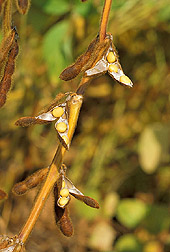This page has been archived and is being provided for reference purposes only. The page is no longer being updated, and therefore, links on the page may be invalid.
Biotechnology's Potential to Improve Seed Composition Outlined
By Alfredo FloresJune 16, 2009
Biotechnology offers a realistic means to not only improve important seed components, but also to boost the overall nutritional quality of seeds, according to a recently published book edited and partly written by Hari B. Krishnan, an Agricultural Research Service (ARS) scientist.
The book, "Modification of Seed Composition to Promote Health and Nutrition," can serve as a textbook for students as well as a primer for scientists, according to Krishnan, a molecular biologist at the ARS Plant Genetics Research Unit in Columbia, Mo.
Published by the Crop Science Society of America, the new book contains the most up-to-date information on biotechnological improvements of seed composition from some of the world's leading scientists in the field.
Biotechnology holds promise to help improve food production to deal with the world's growing population, according to Krishnan. Food production will have to be increased significantly over the next 40 years to feed the predicted world population of 9 billion people by 2050.
Krishnan and his collaborator Joseph Jez at Washington University in St. Louis also wrote a chapter in the book, titled "Sulfur Assimilation and Cysteine Biosynthesis in Soybean Seeds: Towards Engineering Sulfur Amino Acid Content." In that chapter, Krishnan wrote about his work on soybeans, which are an excellent source of protein for humans and animals. The protein quality of soybeans could be enhanced by using genetic engineering to increase the sulfur amino acid content of the beans, which would greatly improve their nutritive value.
Krishnan and his research team have created transgenic soybean plants that express a protein from maize that is rich in the essential amino acid methionine. Krishnan and other scientists are currently manipulating key enzymes involved in sulfur assimilation in soybeans, thereby boosting methionine levels in this important crop. According to Krishnan, methionine is important in human health because it is a raw material for protein synthesis and indirectly regulates a variety of cellular processes.
More information on the book can be found at the Crop Science Society of America website.
ARS is the principal intramural scientific research agency in the U.S. Department of Agriculture.

